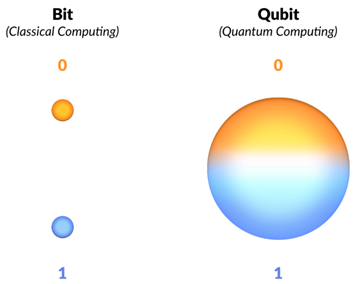Quantum computing is a new and powerful technology that promises to change the way we solve problems. It can process information much faster than the regular computers.
But what does this mean for cybersecurity? Will quantum computers help to improve security, or will they make it easier for hackers to break into our systems?
Let’s explore this question.
What Is Quantum Computing?
Quantum information computers are different from the traditional classical computers we use today. Classical computers use bits, which are 0s and 1s. These 0s and 1s are referred to as states of the computing system, respectively. In contrast to classical computers, quantum computers use the qubits. Qubits can exist in multiple states at once. And these states exist due to a specific property called superposition. This allows quantum systems to perform many calculations at the same time. Therefore; this ability makes the performance of quantum machines incredibly powerful and fast.

Quantum computers can solve very difficult problems quickly, but at the same time they might also create risks for cybersecurity.
Today, our internet security relies on security algorithms that protect our data. We also call the security algorithms as encryption methods. Are these quantum-based computers capable of breaking the encryption systems?
Breaking Encryption?
Encryption is actually a method of protecting information. It is used in a variety of applications, including online banking and messaging apps. Most of today’s encryption methods, such as Rivest-Shamir-Adlema (RSA) and elliptic curve cryptography (ECC), rely on mathematical problems that are extremely difficult for regular computers to solve.
However, quantum computers are capable to solve these problems very quickly. For example, a quantum computer can break the encryption that protects our data using an algorithm called Shor’s algorithm. This means that private information, like credit card numbers and personal details could be revealed.
Another issue comes under symmetric-key encryption, such as the advanced encryption standard (AES) system. Quantum computers could use a different method called Grover’s algorithm to break these systems much quicker than traditional computers.

This raises a serious question: if quantum computers can break our current encryption systems, how can we protect our data?
Quantum-Resistant Cryptography: a wise approach
Experts are developing new encryption methods in order to prepare for the arrival of new challenges in quantum computing. For instance, the methods called quantum-resistant or post-quantum cryptography are designed. These methods are secure even against quantum computing systems.
The goal is to create such kind of encryption techniques that quantum computing devices cannot easily break. Moreover, researchers are testing several different approaches. One of the key areas being explored is lattice-based cryptography. This method uses complex mathematical structures that are difficult for quantum machines to solve.
The U.S. National Institute of Standards and Technology (NIST) is developing a standard for quantum-resistant encryption. This will help ensure that our digital systems stay secure as quantum technology advances, and becomes more powerful.
Nevertheless, the challenge is not easy. The development of quantum-resistant cryptography is still in progress. It may take years before we have reliable systems in place. In the meantime, organizations and governments are already preparing for the future by implementing hybrid systems. Thus, these hybrid systems combine traditional encryption with quantum-resistant methods to provide an extra security.
Can Quantum Computing Improve Cybersecurity?
While quantum computers pose potential risks to cybersecurity, they also present opportunities to enhance it. In fact, quantum technology has the potential to strengthen security in several areas.
Quantum Key Distribution (QKD)
One of the most promising use cases of quantum computing in cybersecurity is Quantum Key Distribution (QKD). QKD leverages the principles of quantum mechanics model to securely exchange cryptographic keys. If anyone tries to intercept the key, the quantum based system will detect it. Therefore; it makes QKD a very secure method for protecting communication.
Better Random Number Generation
Many cipher systems rely on random numbers to generate secure keys. Traditional methods to generate random key can sometimes be predictable, which poses a security weakness. But quantum computers can generate truly random numbers, making security algorithms stronger and harder to crack.
Quantum Computing Machine Learning
Quantum computers could also be used to improve machine learning features. By quickly analyzing large datasets, quantum computers can help to detect digital threats more rapidly. This could result in improved protection against emerging cyberattacks.
Preparations for the Future Quantum Computing
As quantum computing continues to evolve, we must prepare for the changes it will bring to cybersecurity business. Quantum experts are already working on such kind of solutions. Post-quantum cryptography is likely to be the key in ensuring electronic security in a quantum world.
However, the road ahead is not smooth without its challenges. Quantum computing is still in its early stages, and it remains uncertain when it will become powerful enough to break the current encryption systems. To stay ahead, organizations, governments, and researchers must persist in advancing their efforts toward quantum-safe encryption. They must establish new standards, test existing encryption systems, and ensure that digital infrastructure is prepared for the quantum era.
A Perfect Match?
Is quantum computing and cybersecurity a perfect match? It depends on how we approach it. Quantum computing introduces new risks but also unlocks new opportunities. We can use quantum technology to make cybersecurity stronger than ever, if we develop the right tools and strategies.
Proactive preparation is the key to success. By developing quantum-resistant encryption methods and exploring new ways to leverage quantum technology, we can protect our data and digital systems for years to come. Therefore, quantum computing and cybersecurity could form a perfect match with careful planning and research.
In conclusion, while quantum computing presents certain risks, it also holds significant potential to enhance cybersecurity. The future will require us to adapt and innovate quantum information systems. However, if we rise to the challenge, quantum computing has the potential to ultimately make our digital world safer and more secure.



